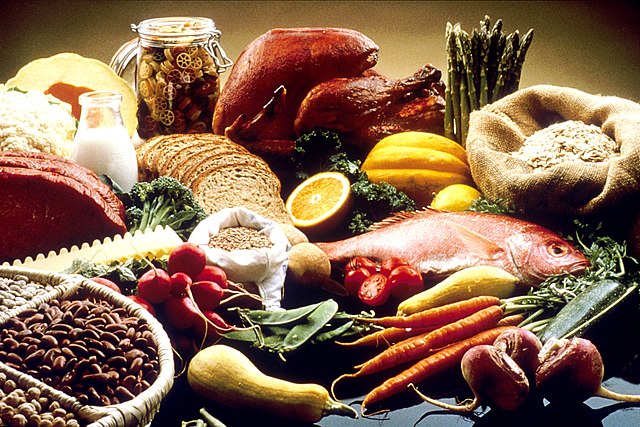any substance consumed to provide nutritional support for the body; form of energy stored in chemical From Wikipedia, the free encyclopedia
Food is what people, plants and animals eat to live. Every organism needs energy to carry on with the process of living which comes from food. Food usually comes from animals and plants. It is eaten by living things to provide energy and nutrition.[1] Food contains the nutrition that people and animals need to be healthy. The consumption of food is normally enjoyable to humans.



It contains protein, fat, carbohydrates, vitamins, water and minerals.[2] Liquids used for energy and nutrition are often called "drinks". If someone cannot afford food they go hungry and could die.
Food for humans is mostly made through farming or gardening. It includes animal and vegetable sources. Some people refuse to eat food from animal origin, like meat, eggs, and products with milk in them. Not eating meat is called vegetarianism. Not eating or using any animal products is called veganism.
| Basic foods consumed by humans | ||
| Plant source | Animal source | |
Food produced by farmers or gardeners can be changed by industrial processes (the food industry). Processed food usually contains several natural ingredients and food additives (such as preservatives, antioxidants, emulsifiers, flavor enhancers). For example, bread is processed food.[3]
Food processing at home is done in the kitchen, by the cook. The cook sometimes uses a cookbook. Examples of cooking utensils are pressure cookers, pots, and frying pans.
Food can also be prepared and served in restaurants or refectory (in particular for children in school).
The utensils used may be a plate, knife, fork, chopsticks, spoon, bowl, or spork.
Many people do not grow their own food. They have to buy food that was grown by someone else. People buy most of their food in shops or markets. But some people still grow most or all of their own food.
People may buy food and take it home to cook it. They may buy food that is ready to eat from a street vendor or a restaurant.
Other countries have their own way of eating food. An example of an ethnic food is Mexican food.
Originally, people got food as hunter-gatherers. The agricultural revolution changed that. Farmers grew crops including those invented and improved by selective breeding.[4] These improvements, for example the invention of maize, allowed feeding more people, and further improvements gave it a better taste.
Food shortage has been a big problem throughout history. Many people do not have enough money to buy the food that they need. Bad weather or other problems sometimes destroy the growing food in one part of the world. When people do not have enough food, we say that they are hungry. If they do not eat enough food for a long time, they will become sick and die from starvation. In areas where many people do not have enough food, we say that there is famine there.
Food and water can make people sick if it is contaminated by microorganisms, bad metals, or chemicals.
If people do not eat the right foods, they can become sick.
People may often have a variety of eating disorders that cause them to either eat too much, or not be able to eat certain things or amounts. Common diseases like Coeliac disease or food allergies cause people to experience ill effects from consuming certain foods that are normally safe. If people eat too much food, they can become overweight or obese. This causes numerous health problems. On the other hand, eating too little food, from lack of access or anorexia could cause malnutrition. Therefore, people have to balance the amount, the nutrition, and the type of food to be healthy.
Many cultures or religions have food taboos. That means they have rules what people should not eat, or how the food has to be prepared. Examples of religious food rules are the Kashrut of Judaism and the Halal of Islam, that say that pig meat cannot be eaten. In Hinduism, eating beef is not allowed. Some Christians are vegetarian (someone who does not eat meat) because of their religious beliefs. For example, Seventh-day Adventist Church recommends vegetarianism.
In addition, sometime beliefs do not relate to the religion but belong to the culture. For example, some people pay respect to Guān Yīn mothergod and those followers will not consume "beef" as they believe that her father has a shape of the cow.
Seamless Wikipedia browsing. On steroids.
Every time you click a link to Wikipedia, Wiktionary or Wikiquote in your browser's search results, it will show the modern Wikiwand interface.
Wikiwand extension is a five stars, simple, with minimum permission required to keep your browsing private, safe and transparent.